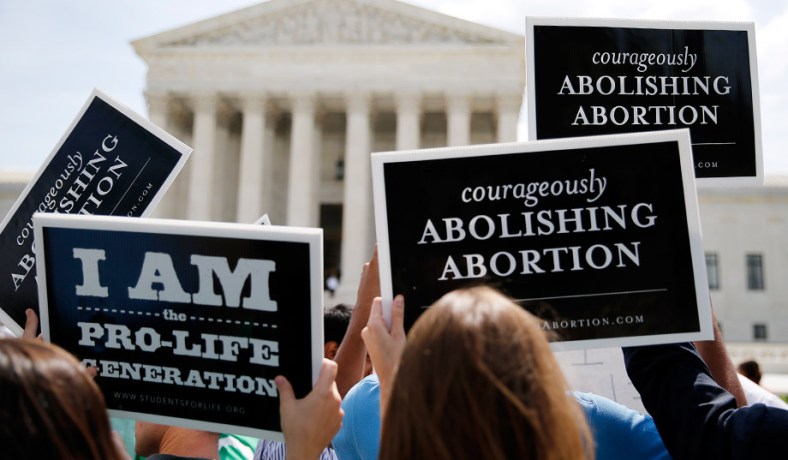Blog Post
Guttmacher Institute warns of “shock and awe campaign against abortion rights” with 28 pro-life laws in only 4 days
The Guttmacher Institute—Planned Parenthood’s research arm—is sounding the alarm on the number of pro-life laws passing on the state level. In an uplifting piece titled “2021 Is on Track to Become the Most Devastating Antiabortion State Legislative Session in Decades,” Guttmacher lays out the pace of pro-life progress:
Right-wing ideologues are engaging in a shock and awe campaign against abortion rights that is largely getting lost against the background of a broader attack on other basic rights, including a wave of voter suppression laws and attacks on LGBTQ people.
The number of abortion restrictions—and specifically bans on abortion designed to directly challenge Roe v. Wade and the U.S. constitutional right to abortion—that have swiftly been enacted over the past four months is unprecedented. If this trend continues, 2021 will end up as the most damaging antiabortion state legislative session in a decade—and perhaps ever.
Tallying the Damage in 2021 so Far
Since January, there have been 536 abortion restrictions, including 146 abortion bans, introduced across 46 states (all counts current as of April 29, 2021). A whopping 61 of those restrictions have been enacted across 13 states, including eight bans.
To put those figures in context, by this time in 2011—the year previously regarded as the most hostile to abortion rights since Roe was decided—42 restrictions had been enacted, including six bans.
Due to the numbing effect from the onslaught of abortion restrictions enacted over the past 10 years, the level of damage to abortion rights and access may not be immediately apparent. It is no accident that 89% of the 61 restrictions enacted this year were in states already considered to be hostile or very hostile toward abortion rights. The 2021 abortion restrictions largely build on earlier ones, as each additional restriction increases patients’ logistical, financial and legal barriers to care, especially where entire clusters of states are hostile to abortion.
As our earlier analysis predicted, state policymakers are testing the limits of what the new U.S. Supreme Court majority might allow and laying the groundwork for a day when federal constitutional protections for abortion are weakened or eliminated entirely. The damage would fall heaviest on people already marginalized and oppressed by structural inequities, including people with low incomes, people of color, young people and LGBTQ people. In response, state policymakers, the Biden-Harris administration and Congress must act to safeguard the right to abortion, including through passage of the Women’s Health Protection Act, which would establish federal statutory abortion rights for providers and patients against state restrictions and bans.
A Devastating Record: 28 Abortion Restrictions Enacted in Just Four Days
Between April 26 and April 29, 28 new restrictions were signed into law in seven states—almost half (46%) of the restrictions passed so far in 2021. This was the highest number of new restrictions signed in a single week in at least a decade. That count includes multiple abortion bans that directly challenge Roe: a near-total ban on abortion in Oklahoma, six-week abortion bans in Idaho and Oklahoma, a 20-week ban in Montana, and a ban on abortion for non-lethal genetic anomalies in Arizona.
Another alarming trend is states’ continued focus on restricting medication abortion, with four new restrictions in Montana, three in Indiana and another restriction in Arizona. This trend is a direct response by antiabortion legislators to the push for broader telehealth access to that method during the COVID-19 pandemic, and it follows the U.S. Food and Drug Administration’s April 12 decision to allow patients to receive medication abortion pills by mail during the pandemic.
State legislatures are also falling back on their well-worn playbook of imposing unnecessary and intentionally burdensome restrictions on abortion clinics and providers. Five states—Arizona, Arkansas, Indiana, Kentucky and Oklahoma—enacted restrictions on abortion clinics, an issue that has not been hot in state legislatures since the Supreme Court in 2016 struck down regulations enacted in Texas. Most notably, Arkansas and Kentucky passed laws making it easier for state agencies to close abortion clinics.
Furthermore, a disturbing record was set this week: With its enactment of a new restriction on abortion clinics, Arkansas has now enacted 20 restrictions in 2021, tying Louisiana’s 1978 record for the most restrictions in a single year.
Looking ahead, abortion rights continue to face an all-out assault. Among the most concerning states this week are Texas (where 17 restrictions have passed at least one chamber) and Oklahoma (where a conference committee is considering additional restrictions on medication abortion).
The current barrage of coordinated attacks must be taken seriously as the unprecedented threat to reproductive health care and rights that it is. The year 2021 is well on its way to being a defining one in abortion rights history.
Reason, I’m sure you’ll agree, for optimism.








